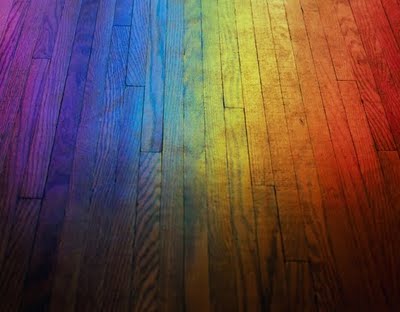Jessica Eaton
Monday, 16 November 2009
Work from her oeuvre.
“Eaton’s exhibit is a display of virtuosity, each piece a microcosm of what could become the basis for a larger show. Every print in the Emily Carr Institute graduate’s show represents a technical practice she has been refining for a year or more, as she related at the opening. “108_06″ unveils a bare gallery wall as a wormhole to the whole photonic spectrum through a process called “masking,” the contemporary version of which is commonly used in digital imaging. Eaton, however, uses the earlier and painstaking analog version: to create “108_06,” she had over a hundred uniquely manufactured darkslides laser-cut to her specifications, which she then used to expose one piece of film at a time to red, green and blue separation filters. “These are the primary colours in light [additive] colour theory,” she explains. “By multiply exposing each square to different combinations of pure red, green, and blue, I can make ‘normal’ white light and a set of additive secondaries-magenta, yellow, and cyan-visible at the same time.” She’s been working on the technique for approximately five years.
Eaton’s work re-imagines ’70s-era minimalist and conceptual art: a time when artists aimed to strip the aesthetic object down to its most essential state and concept took precedence over traditional aesthetic concerns (a serial work of Eaton’s-a diamond pattern captured mid-liftoff from its foundation of grid paper-especially invokes Sol LeWitt). Like her predecessors, Eaton uses a purist’s palette, but, rather than baring the aesthetic object, she reveals it in the process of undressing.
In the best of cases, Eaton’s hesitation in paring down the object imbues her work with a heady sense of mystery. We look through “Shadow 9″ and “108_06″ and glimpse the sensory world’s inchoate elements quietly gathering, but Eaton keeps the curtains mostly drawn. Her modesty creates a worshiper of the viewer, compelled by the ever-unfulfilled promise of the unknown. Certain pieces reflect her strengths to greater effect: the light from a window covered in film gels that she installed in her own apartment carries greater conceptual and poetic weight in “Shadow 9,” where its rainbows filter through a cosmogonally black circle of heavy stock card onto a white sheet of paper, than in the photograph of the window itself. Ditto the print of the window’s technicolour reflection on her apartment floor. But the exhibit’s overall effect is erotic: it piques and prolongs the thrum of audience interest and does not explore the artist’s maturity as such. To that effect, Eaton’s patience with and innovative application of singular production methods, and the visceral pull created therein, make for a thrilling tease” – Teresa Saplys




